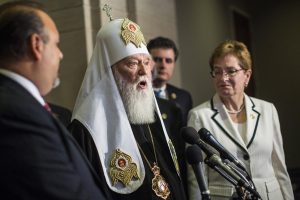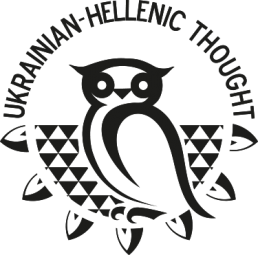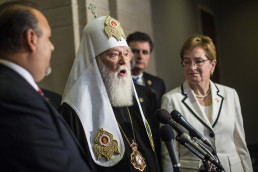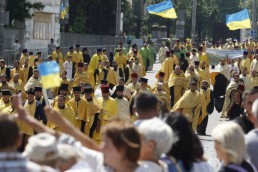Russia’s War on Ukraine Roils the Orthodox Church

The Challenge for Russia
For Russia, an autocephalous Ukrainian Orthodox Church poses a strategic challenge. The Moscow Patriarchate stands to lose up to one-third of its parishes, some of the most active in the Russian Orthodox Church. It also would lose its claim to sole inheritance of the baptism of Kievan Rus in 988. (The adoption of Orthodox Christianity by the ancient principality of Rus, in what is now Ukraine, is the historic event that Russians embrace as the origin of the Russian state and identity.) That loss would diminish the Moscow Patriarchate’s claim to leadership of Eastern Orthodox Christianity. Autocephaly for the Ukrainian Orthodox Church also undermines President Vladimir Putin’s use of the Russian Orthodox Church to legitimize his regime within Russia and to influence other Eastern Orthodox countries. It is therefore not surprising that Russia and the Moscow Patriarchate have reacted to autocephaly with threatening statements. Echoing words used in advance of Russia’s invasion of Ukraine, the Kremlin spokesman, Dmitry Peskov, said that "Russia … as it defends the interests of Russians and Russian-speakers, as Putin has always said, in the same way ... defends the interests of the Orthodox Christians.” The Kremlin and the Moscow Patriarchate have mounted a diplomatic and disinformation campaign to press the Orthodox patriarchs to question Ecumenical Patriarch Bartholomew’s decision and his authority. More aggressive actions are likely to follow. Even if Russia cannot annul Bartholomew’s decision, it will seek to undermine its implementation by swaying opinion, sowing dissension, and instigating conflict. The Associated Press recently documented the invasion of the Ecumenical Patriarchate’s computers by Russian hackers. Meanwhile, an iconic Kyiv church, St. Andrew’s, was attacked with a Molotov cocktail after the government transferred it to the Ecumenical Patriarchate. And Ukrainian authorities are investigating priests for allegedly inciting hatred and violence.Ukraine’s Response Is Critical
Ukraine’s careful management of the autocephaly transition will be essential to counter Russia’s campaign. At the same time, Ukrainian patriotism, regardless of faith, stirred by autocephaly provides an opportunity and a responsibility to strengthen Ukraine’s commitment to a multifaith, pluralist society and to democracy and good governance. Following the Ecumenical Patriarchate’s ruling, Ukraine will need to forge a single Ukrainian Orthodox Church from among the three existing groups (including the one governed by the Moscow Patriarchate). Yet the government must avoid establishing a Ukrainian state church and must allow those parishes that choose to continue following the Moscow Patriarchate to do so. Authority over many church properties will need to be transferred and will become the objects of conflicts. So that process must be handled with transparency and adherence to the law. Multifaith institutions, such as the All-Ukrainian Council of Churches and Religious Organizations, which includes Jewish and Islamic representatives along with Christian denominations, will play an essential role in building cohesion. As trusted faith leaders, the council’s members have a vital role in countering rumors and untruths and speaking out for a multifaith society. By adhering to this path, Ukraine can blunt Russia’s campaign, build international support for autocephaly, and possibly provide a model for the Eastern Orthodox Church’s role in a pluralist society.The Risk of Unintended Consequences
Other powers will play an important role in determining how autocephaly rolls out in Ukraine and its impact on the Eastern Orthodox Church. Western powers have stated their support for religious freedom and for Ukrainian autocephaly. Perhaps more important will be their response to armed Russian aggression, including Russia’s recent attack on three Ukrainian vessels attempting to navigate the Kerch Strait. A weak response will embolden Russia and weaken the resolve of states and churches under pressure to align themselves with the Russian Orthodox Church. The Holy See or other religious entities could play a quiet diplomatic role, providing good offices, mediation and dialogue, to support the autocephaly transition in Ukraine and facilitate discussion across Orthodox churches. Turkey, although an Islamic country, could play a decisive role. Turkey could have stopped the ecumenical patriarch, who resides in Istanbul, from issuing his decision on autocephaly. By standing back, Turkey effectively dealt a blow to Russia, its powerful neighbor and sometimes ally. The Kremlin’s aggression against Ukraine has already backfired once, leading to autocephaly for Ukraine and a blow to the Russian Orthodox Church’s stature. The current campaign to reverse that decision and to replace the ecumenical patriarch—in addition to new aggressive actions in the Azov Sea--could again have unintended results, including an historic schism in the Orthodox Church and new conflict across Eastern Europe. We don’t know how this will play out, but Russia must heed, and the international community must anticipate, the risk of unintended consequences from Russia’s actions. https://www.usip.org/publications/2018/12/russias-war-ukraine-roils-orthodox-churchRussia Wages a Religious War Against Ukraine
The Kremlin tries without success to dominate the Eastern Orthodox Church. By Michael Khodarkovsky Sept. 30, 2018 A Ukrainian Orthodox Church of Kiev patriarchate march in Kiev, July 28.
PHOTO: NURPHOTO VIA ZUMA PRESS
Russia’s assault on Ukraine unfolded along military, economic and diplomatic lines. Vladimir Putin’s Moscow also is waging a less-noticed war on Ukraine’s religious sovereignty. To understand this, look at the structure of Eastern Orthodox Christianity. The church consists of 14 autocephalous, or self-governing, churches. Religious and national identities often overlap, as in the Orthodox Churches of Russia, Romania, Bulgaria and Georgia. Each national church falls under a particular patriarchate, and the ecumenical patriarch of Constantinople is considered first among equals.
In recent centuries, Ukrainian believers had belonged to the Russian Orthodox Church. Shortly before the demise of the Soviet Union in 1991, a council of bishops in Ukraine declared the church’s independence from Russia. In the ’90s, the new leader of the Ukrainian Orthodox Church—Filaret, the metropolitan bishop of Kiev—came under pressure from Russian church and security officials to resign. He refused. In 1997 the patriarch of the Russian church excommunicated him and declared his followers schismatics.
An estimated 12,300 parishes in Ukraine continue to follow Moscow and belong to what is known as the Ukrainian Orthodox Church of the Moscow Patriarchate. Meantime, some 5,100 parishes switched to the Ukrainian Orthodox Church of the Kiev Patriarchate, led by Filaret.
Patriarch Filaret seeks recognition of the Ukrainian Orthodox Church as autonomous and independent, and he is about to get it. The ultimate arbiter in this dispute is Ecumenical Patriarch Bartholomew of Constantinople. On Sept. 23 he confirmed his intention to issue a tomos, or decree that confers the independence of a local church, for Ukraine.
The ties between the Kremlin and the Moscow Patriarchate are as old as Russia itself. Throughout its history, the Russian Orthodox Church had been subservient to the state and an unshakable supporter of autocracy. Since the late 15th century, the church provided Moscow’s rulers with a political theology of manifest destiny, asserting that Moscow had become the Second Jerusalem and the Third Rome (Constantinople being the second).
The emergence of the atheist Soviet state in 1922 dealt a severe blow to the church. The state confiscated most ecclesiastical property. It destroyed many churches while turning others into storage places. Steeples that rose high enough became jamming stations to prevent Voice of America or the BBC from reaching Soviet citizens. Few seminaries survived. Those that did, trained a small number of priests. The KGB infiltrated the priesthood, informing on clergy and promoting Soviet interests abroad.
During Russia’s brief experiment with democracy in the 1990s, the church rebounded from decades of suppression. But under Mr. Putin the state quickly co-opted and subsumed the church. The Kremlin has relied on the Orthodox Church as the main unifying force in the country and provides it with generous financial support. In return, the church has been the key promoter of the “Russian World” concept that casts the Kremlin as a defender of Russians outside Russia. Patriarch Kirill has called the Putin era “a miracle of God.”
The prospect of Ukraine’s autocephaly would mean losing millions of dollars worth of properties and thousands of priests in Ukraine. It would deprive Moscow of power over several million Ukrainians. Most important, it would deal a serious blow to Moscow’s ambition of being the leader of Orthodox Christianity.
Moscow has put pressure on Patriarch Bartholomew using unsavory methods. A group of Kremlin-connected hackers, recently indicted in the U.S., stole thousands of email messages from Patriarch Bartholomew’s aides. That backfired: The patriarch does not use email and no compromising material from his aides emerged.
On Aug. 31 Patriarch Kirill made an urgent visit to Istanbul to dissuade Patriarch Bartholomew from issuing a tomos. The two do not see eye to eye. While Patriarch Kirill considers Western values as antithetical to the Russian Orthodoxy, Patriarch Bartholomew supports closer ties with Western churches, including the Vatican.
Patriarch Kirill argued that Moscow has led the Ukrainian Orthodox church for 300 years, but this sounded hollow in the halls of Patriarch Bartholomew’s Istanbul headquarters. For Bartholomew and other patriarchs the historical record is clear: the Constantinople patriarchs never officially approved Russia’s claims over the Ukrainian church. Patriarch Kirill returned to Moscow empty-handed.
Moscow has resorted to traditional bullying, issuing unspecified threats and denouncing Patriarch Bartholomew as an agent of the U.S. and the Vatican. When the threats failed, on Sept. 14 the Russian church issued a formal statement condemning Bartholomew’s intention to grant autocephaly to Ukraine. In a sign of an ultimate break, Moscow also announced that it would stop using Bartholomew’s name in prayers.
Mr. Putin’s geopolitical goal of turning Ukraine into a satellite state instead has given Ukraine a renewed sense of its national identity. Russia’s spiritual imperialism has also diminished the Russian Orthodox Church. These expansionist policies, holy and worldly, are leading to Russia’s further isolation.
A Ukrainian Orthodox Church of Kiev patriarchate march in Kiev, July 28.
PHOTO: NURPHOTO VIA ZUMA PRESS
Russia’s assault on Ukraine unfolded along military, economic and diplomatic lines. Vladimir Putin’s Moscow also is waging a less-noticed war on Ukraine’s religious sovereignty. To understand this, look at the structure of Eastern Orthodox Christianity. The church consists of 14 autocephalous, or self-governing, churches. Religious and national identities often overlap, as in the Orthodox Churches of Russia, Romania, Bulgaria and Georgia. Each national church falls under a particular patriarchate, and the ecumenical patriarch of Constantinople is considered first among equals.
In recent centuries, Ukrainian believers had belonged to the Russian Orthodox Church. Shortly before the demise of the Soviet Union in 1991, a council of bishops in Ukraine declared the church’s independence from Russia. In the ’90s, the new leader of the Ukrainian Orthodox Church—Filaret, the metropolitan bishop of Kiev—came under pressure from Russian church and security officials to resign. He refused. In 1997 the patriarch of the Russian church excommunicated him and declared his followers schismatics.
An estimated 12,300 parishes in Ukraine continue to follow Moscow and belong to what is known as the Ukrainian Orthodox Church of the Moscow Patriarchate. Meantime, some 5,100 parishes switched to the Ukrainian Orthodox Church of the Kiev Patriarchate, led by Filaret.
Patriarch Filaret seeks recognition of the Ukrainian Orthodox Church as autonomous and independent, and he is about to get it. The ultimate arbiter in this dispute is Ecumenical Patriarch Bartholomew of Constantinople. On Sept. 23 he confirmed his intention to issue a tomos, or decree that confers the independence of a local church, for Ukraine.
The ties between the Kremlin and the Moscow Patriarchate are as old as Russia itself. Throughout its history, the Russian Orthodox Church had been subservient to the state and an unshakable supporter of autocracy. Since the late 15th century, the church provided Moscow’s rulers with a political theology of manifest destiny, asserting that Moscow had become the Second Jerusalem and the Third Rome (Constantinople being the second).
The emergence of the atheist Soviet state in 1922 dealt a severe blow to the church. The state confiscated most ecclesiastical property. It destroyed many churches while turning others into storage places. Steeples that rose high enough became jamming stations to prevent Voice of America or the BBC from reaching Soviet citizens. Few seminaries survived. Those that did, trained a small number of priests. The KGB infiltrated the priesthood, informing on clergy and promoting Soviet interests abroad.
During Russia’s brief experiment with democracy in the 1990s, the church rebounded from decades of suppression. But under Mr. Putin the state quickly co-opted and subsumed the church. The Kremlin has relied on the Orthodox Church as the main unifying force in the country and provides it with generous financial support. In return, the church has been the key promoter of the “Russian World” concept that casts the Kremlin as a defender of Russians outside Russia. Patriarch Kirill has called the Putin era “a miracle of God.”
The prospect of Ukraine’s autocephaly would mean losing millions of dollars worth of properties and thousands of priests in Ukraine. It would deprive Moscow of power over several million Ukrainians. Most important, it would deal a serious blow to Moscow’s ambition of being the leader of Orthodox Christianity.
Moscow has put pressure on Patriarch Bartholomew using unsavory methods. A group of Kremlin-connected hackers, recently indicted in the U.S., stole thousands of email messages from Patriarch Bartholomew’s aides. That backfired: The patriarch does not use email and no compromising material from his aides emerged.
On Aug. 31 Patriarch Kirill made an urgent visit to Istanbul to dissuade Patriarch Bartholomew from issuing a tomos. The two do not see eye to eye. While Patriarch Kirill considers Western values as antithetical to the Russian Orthodoxy, Patriarch Bartholomew supports closer ties with Western churches, including the Vatican.
Patriarch Kirill argued that Moscow has led the Ukrainian Orthodox church for 300 years, but this sounded hollow in the halls of Patriarch Bartholomew’s Istanbul headquarters. For Bartholomew and other patriarchs the historical record is clear: the Constantinople patriarchs never officially approved Russia’s claims over the Ukrainian church. Patriarch Kirill returned to Moscow empty-handed.
Moscow has resorted to traditional bullying, issuing unspecified threats and denouncing Patriarch Bartholomew as an agent of the U.S. and the Vatican. When the threats failed, on Sept. 14 the Russian church issued a formal statement condemning Bartholomew’s intention to grant autocephaly to Ukraine. In a sign of an ultimate break, Moscow also announced that it would stop using Bartholomew’s name in prayers.
Mr. Putin’s geopolitical goal of turning Ukraine into a satellite state instead has given Ukraine a renewed sense of its national identity. Russia’s spiritual imperialism has also diminished the Russian Orthodox Church. These expansionist policies, holy and worldly, are leading to Russia’s further isolation.
Mr. Khodarkovsky, a professor of history at Loyola University Chicago,
is author of “Russia’s 20th Century: A Journey in 100 Histories,”
forthcoming from Bloomsbury.
https://www.wsj.com/articles/russia-wages-a-religious-war-against-ukraine-1538329125#comments_sector

